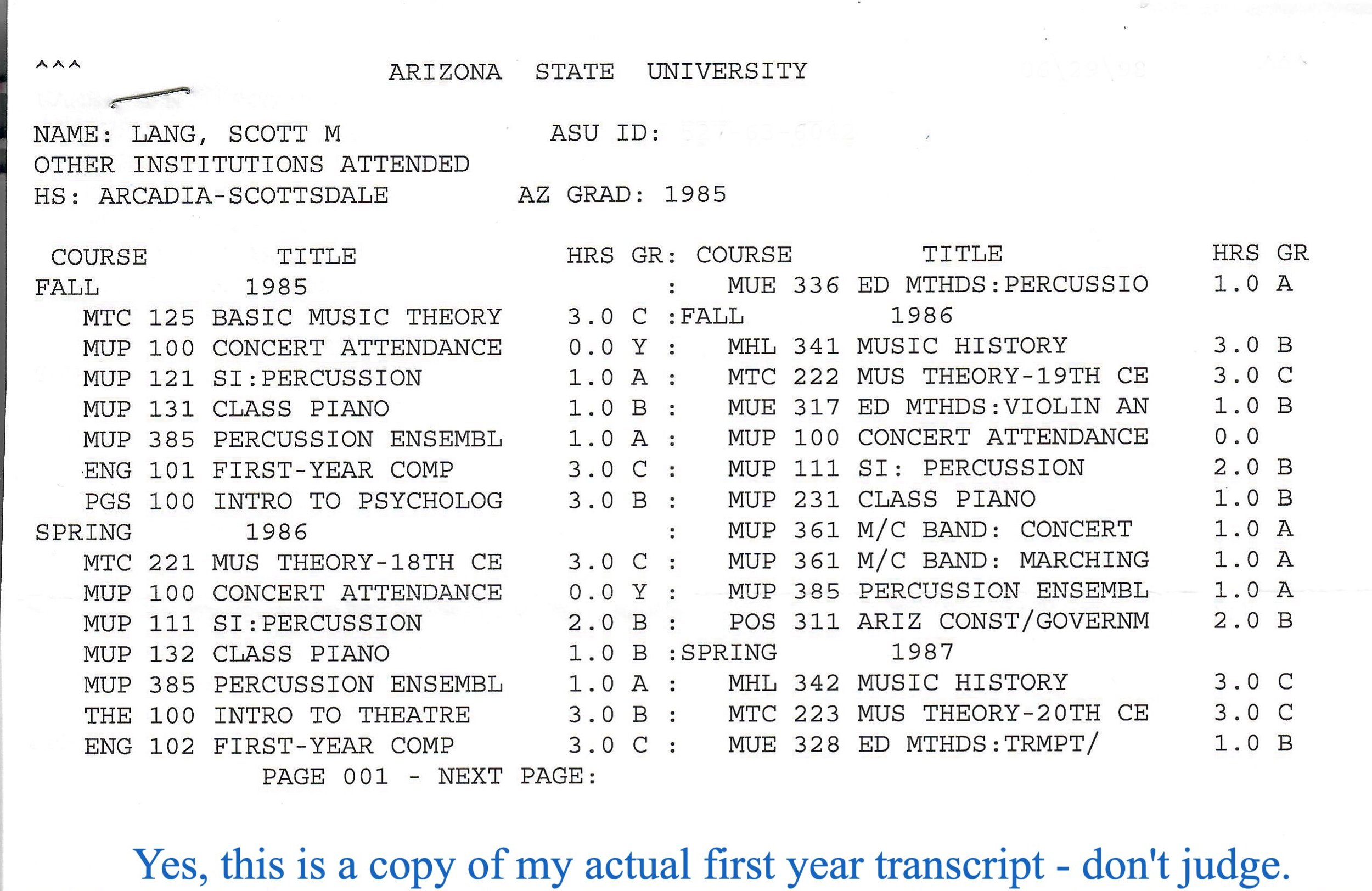This is #5 in a series that rethinks music education by asking, "Why Not?"
After almost every workshop, a student will approach me and share their desire to be a music teacher. Whether they are sharing it in hopes of affirmation or to declare their aspiration, I always share the same response:
"Other than raising two children, getting a degree in music education is the hardest thing I have ever done in my life."
It is a worthy thing indeed, but extraordinarily difficult, like opening a plastic blister pack blindfolded while folding a fitted sheet type of difficult. Likely, you are smarter than me and did not suffer the slings and arrows of music theory the way I did, but the evidence sides with me. I started with 136 music majors on day one of basic music theory and graduated four and a half years later with just three of them. Some may have made it in four years (not likely), while some may have graduated after me (maybe a couple). The rest?
They fell by the wayside, dropped out, or just came to their senses and decided that was not the life for them.
Can you blame them? Ever wished you joined them?
I am unsure if the requirements for a degree in music education are rooted in teacher preparation or designed to weed out those who lack the fortitude, tenacity, and grit it takes to survive and thrive in this profession. Either way, it's doing its job.
Don't believe me? A typical bachelor's degree in the United States consists of 120 hours. My Bachelor's Degree in Music Education? One hundred and forty-six hours! And I did not change majors or take a single class that was not required for graduation.
Yep, the same degree my pals in the business school received required me to complete an extra year of college, adding time, expense, and strain they did not have to endure.
You are severely mistaken if you think the educational delta differential ends at credit hours. So for this e-zine, I dug up my transcript and discovered that as a part of my pathway to the podium, I attended:
Seventy-two classes (average degree is 40), averaging 2.02 credits (33% less than other classes).
An average of 17.5 hours a semester, plus summer school two summers.
Ten required classes that offered zero credits.
Twenty-six required classes meeting more than once a week for just a single credit.
Two years of marching band, meeting six days a week for one credit.
Five semesters of music theory, meeting five days a week for three credits.
Two hours of practicing a day, in addition to homework.
Two semesters of student teaching (a full-time job) for nine credits.
Ninenty-two night time or weekend performances/events.
All while working as a bartender to pay for my tuition.
I do not share this for your admiration or adoration, as I know that you endured the same things. We are kindred spirits in that way. So let me repeat, for me:
Getting a degree in music education is the second hardest thing I have done in my life.
In fact, to my way of thinking, getting a degree in music education makes you better at everything in your life. As a part of your job, you learn to:
Work with kids and adults.
Speak publicly and write effectively.
Plan for the future, but think on your feet.
Manage millions of dollars in budgets, facilities, and equipment.
Hire, fire, and supervise adult and juvenile staff.
Analyze complex situations and adjust on the fly.
Receive feedback and constructive criticism from peers.
Create art and facilitate the steps needed to realize it.
And so much more. I genuinely believe that getting a degree in music education will make you a better person, parent, and anything else you decide to do with your life. At least it did for me.
I just don't think it should be a bachelor's - it should be a master's.
Why not eliminate the bachelor's degree and (for the exact same requirements/credits) award a master's degree? Think about it:
A master's degree is an additional thirty hours, twenty-six of which are completed.
I completed seventy-six classes, exceeding the requirements for a master's degree.
A undergraduate degree in music education is designed to be an extra eighteen months - similar to that a Master's.
I have real work experience over a year (student teaching).
If credits are awarded by the number of hours met, I would have over two hundred credits, equivalent to a doctorate.
So, today, I am proposing to eliminate the Bachelor of Music Education degree and replace it with a Masters Degree.
This would:
Provide an immediate pay bump for music educators.
Reward for increased workload and hours associated with the job.
Clearly and demonstrably demonstrate that this is a five+ year program.
Provide an immediate and permanent pay increase resulting in a lifetime benefit of over $150,000.
Help attract and retain more music teachers.
Reduce the time and financial demands of continuing education credits.
Elevate the status of the degree and our profession.
While we're at it - since my Masters Degree in Education Administration and Policy Studies left me just three classes and a dissertation short of my doctorate, I am also proposing that (since we already have a master's degree), when coupled with a dissertation, the current master's should be awarded as a doctorate.
The math associated with credit/classes/time adds up.
It saves students money and earns teachers more money.
It helps to attract and retain music teachers.
And, I believe is the right thing to do.
So, why not?
Have a great week, everyone.
Dr. Scott (see what I did there?)
p.s. The rules surrounding capitalization and the possessiveness of degrees are oddly specific and wildly inconsistent. I followed the rules as best as I understood them.
© SCOTT LANG LEADERSHIP 2024 - all rights reserved
BPOTM / SLL 505 S. CAMELLIA DRIVE Chandler, Arizona 85225 United States

